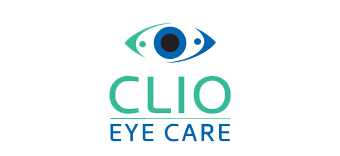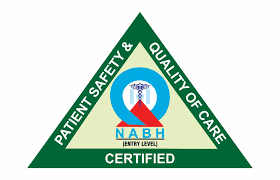LASIK – LASER VISION CORRECTION
Our Services
Quick Consultation
Testimonials
Had a very good experience from the first consultation to the follow-up visits for my LASIK surgery. Dr. Aditi provides good information and details things really well. The staff is helpful and ensures timely reminders wherever needed. Best wishes to keep providing quality care services to their patients.
Types of LASIK Surgery
ENJOY FREEDOM FROM GLASSES WITH THE MOST ADVANCED SPECS REMOVAL SURGERY AT CLIO EYE CARE

What is LASIK Laser Eye Surgery?
As the name suggests, laser eye surgery means using a laser to change the shape of the cornea (surface of your eye) – to correct focusing errors with extreme precision. LASIK (Laser assisted in- situ Keratomileusis) is a highly successful and permanent solution for freedom from glasses and contact Lenses. The result can be a dramatic improvement in your vision and your lifestyle.
Could LASIK Change Your Life?
Needing glasses or contacts to see may cramp your lifestyle. Glasses fog up, fall off, scratch, and break. Frames and thick lenses interfere with side vision. Contacts can irritate your eyes, especially if dust gets under a lens or you have dry eyes or allergies. Both glasses and contacts can limit your choice of careers or sports. LASIK may be an option that could reduce or eliminate your need for glasses and contacts.
The life-changing benefits are so significant that LASIK has become one of the most frequently performed elective surgeries in the world, with over 30 million people already experiencing the freedom of life without glasses and contacts – thanks to LASIK.
Are You a Candidate for LASIK?
To know if you are fit for LASIK, you need to undergo some ocular screening examinations.
In general, a good LASIK candidate is at least 18 years old, has healthy corneas, and has maintained a stable eye prescription for the last 12 months. Because hormonal levels can affect the shape of the eye, women who are pregnant or nursing should not undergo LASIK treatment.
The procedure should also NOT be performed on patients who:
- Have glaucoma, cataracts or dry eyes
- With collagen vascular, autoimmune or immunodeficiency diseases
- Show signs of keratoconus (an eye disorder in which there is thinning of the cornea that results in blurred or distorted images)
- Take medications with ocular side effects (such as Accutane or Cordarone).
Why choose CLIO Eye Care for LASIK?
We at CLIO EYE CARE, understand that every eye is unique, and so when it comes to spectacle removal, the treatment must be customized to each individual eye for the best outcome.
CLIO Eye Care is considered one of the Best Eye Cinic in Delhi NCR for LASIK laser treatment.
LASIK is a treatment of the cornea, so ideally it should be performed by a trained Cornea Specialist.
At CLIO Eye Care, all our Lasik procedures are done by experienced and internationally trained Cornea Surgeon – Thereby assuring you the best results with long term safety. Entire LASIK workup and planning of laser treatment is done by doctor, ensuring complete precision and fantastic outcomes.
CLIO EYE CARE LASIK Protocol
LASIK screening protocol at CLIO EYE CARE
- Refraction
- Dilated Retinal Examination
- Dilated /cycloplegic refraction
- Intraocular pressure testing
- Pachymetry (to assess corneal thickness)
- Corneal Topography Orbscan/Pentacam
- Dry Eye Analysis
- Wavefront examination and Aberrometry
Once all tests are performed and patient is found to be fit for the procedure, patient is scheduled for Surgery.
What happens during a LASIK Procedure?
LASIK is performed as a day care procedure. You walk in on the day scheduled for your surgery and walk out of the Eye Centre about half an hour after the surgery. Both the eyes are treated at the same sitting.
A topical anesthetic(numbing drop) is instilled into the eyes few minutes prior to surgery.
- Step 1: A thin flap of the cornea is made using an instrument called Microkeratome or using Femtosecond Laser.
- Step 2: The flap is lifted and folded back
- Step 3 – The exposed area is resurfaced using the excimer laser beam.
- Step 4: The flap is replaced carefully.
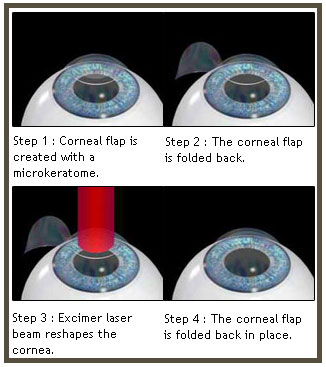
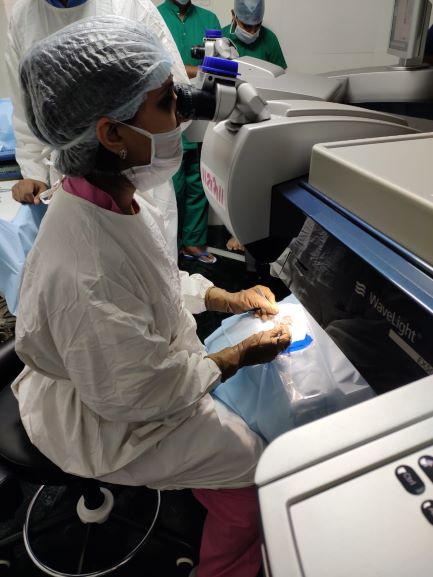
The entire procedure takes around 15 minutes.
After the procedure, you are advised to wear dark goggles/sunglasses, avoid contact with dust and instill eye drops as advised regularly. It is advised to take rest on the day of surgery. You need to follow up with the doctor the next day.
Is LASIK Right for everyone?
The success of LASIK depends mainly on whether your vision is stable and you have myopia (nearsightness) or hyperopia (farsightness) with or without astigmatism, and no other eye problems. You also need to understand the possible risks and be realistic about what to expect.
- LASIK works well for most people. But, for the best results, you may sometimes need a second LASIK procedure called enhancement.
- It takes at least several days to a few weeks for your eye to heal and your vision to clear.
- You’ll feel minimal discomfort during and after the procedure
- In case you have a high spectacle prescription or a thin cornea or some other condition making you unfit for LASIK, there may be other options available for you, such as surface ablation(PRK) or Phakic IOL(ICL/IPCL).
To know more about which procedure is best for you, consult our experienced Eye Care Professional.
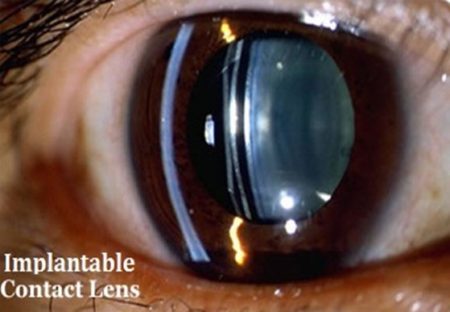
Is LASIK safe?
The US FDA recognizes LASIK as a proven, safe and effective procedure. Fewer than 1% of patients who have received LASIK to date have experienced serious, visionthreatening problems. Most LASIK complications can be treated and usually resolve within several months of surgery.
What are the risks associated with LASIK?
Like any other surgery, LASIK is also associated with some risks and complication, although rare.
The minor complications include:
Halos – Some patients will notice glare, halos or starburst around objects in low-light conditions. For the vast majority, these symptoms are temporary. However, others will continue to experience them for several months or longer. During pre-operative evaluation, the refractive surgeon can determine whether or not a person is at high risk for seeing long-term halos and council the patient regarding the possibility of the same.
Dry eyes – There is increased dryness of the eyes typically for several months following LASIK, though some patients may experience dryness for a longer period of time. It is important to use lubricating drops frequently. If the eyes remain dry for prolonged period, there are other drops or techniques that can help. Pre-operative evaluation will help determine whether or not a person is a likely candidate for experiencing dry eyes.
Infection – This is an extremely rare occurrence, with a 1 in 2000-3000 chance (similar to any eye surgery). Fortunately, as the LASIK technique has developed over the years and proven to be of great benefit to millions of patients nationwide, firmly established protocols now exist which minimize the risk of infection.
FAQs
The following are the important criteria to fulfill before considering for any spectacle removal surgery
- Age above 18 yrs
- Stable prescription for last 1 year
- Overall good Eye Health
These are the broad criteria that must be met before planning for surgery. Of course Physical examination and a thorough assessment by our LASIK surgeon will confirm your suitability for specs removal.
No, the laser procedure itself does not hurt. Anaesthetic drops (Paracaine eye drops) are put in your eyes just prior to taking you inside the OT to numb the eyes. All you need to do is stay calm, lie down on a Table inside the LASIK OT, and follow the Surgeon’s instructions. While undergoing the LASIK, you may feel slight pressure on your eye during the procedure for a few seconds. But there is NO PAIN.
You are advised to stop using contact lenses, at least 5 days prior to procedure.
Put the antibiotic drops advised by the doctor in both eyes 4 times a day one day prior to surgery and once in the morning on day of surgery.
Wash your hair on the day of surgery as you will be advised to avoid head bath for at least 3-5 days after surgery.
Do not use any kind of eye make up or face make up on day of Surgery. Clean your eye lid margins well one day before to remove any kajal or mascara residues.
Do not apply any perfumes or deodorants on the day of surgery.
You can have a normal light breakfast before coming to the hospital for LASIK.
You will be advised to start some eye drops right from the day of surgery. Instill the drops as advised by the doctor. Avoid rubbing your eyes. You can clean your eyes with a sterile cotton swab soaked in boiled water or with sterile lid wipes, making sure you don’t touch the cornea ( black part of your eye ball).
You will be advised to wear dark goggles after the surgery, throughout the day for the first 3 days. After 3 days, you would need to wear the dark glasses only when you go outdoors, you do not need to wear them inside your house. The dark glasses help protect your eyes from dust and also helps to prevent you from touching and rubbing your eyes.
You can have your normal food after laser treatment.
Avoid smoking for at least 2 weeks as the smoke fumes can increase dryness felt in the eyes.
You can start using your phone from the very next day. Desktop, laptop usage can be done from the 3rd day onwards in a graded manner. That means on 3rd day you can spend 2 hrs on the laptop, 4th day 4 hrs, 5th day 5-6 hrs and so on. By 5th Day of Surgery most people are comfortable to resume their routine.
You are advised to avoid driving back home on the day of surgery. Most patients are comfortable to drive by the 5th post operative day. Sometimes, night driving may be a bit difficult during first few days, however the glare settles over next 2 weeks.
For females, you are advised not to use any eye make up for 2 weeks. Threading of eyebrows and eye make up may be done after 2 weeks taking care to avoid too much pressure on the eye.
After LASIK, you would be prescribed eye drops which would need to be put as advised by your doctor. The antibiotic and anti-inflammatory drops are to be put for 3 weeks in a tapering dose and the lubricant drop are continued for a month. Some patients prefer to continue the lubricant for longer period after LASIK.
Yes, LASIK Laser surgery is safe, and is one of the most common eye surgeries done today with highly successful and predictable outcomes. But as in every surgery, there are certain potential risks that you should know about. Although these risks/complications are very rare, they will be discussed with you during your counselling.
Yes. Now with newer advances, and cutting edge technology there are LASIK Platforms that can help to treat Presbyopia. For patients who are above the age of 45years, and wish for spectacle independence for distance and near, we offer SUPRACOR Presbyopic LASIK. Our surgeon will discuss this option with you during your visit.
Our LASIK surgeon is among the first few surgeons in North India who started performing SUPRACOR Presbyopic LASIK.
